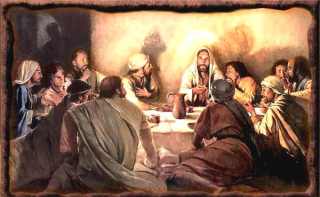 There are about 10 million tithing Christians in America who give an estimated $50,000,000,000 annually to their churches and other charitable causes. That’s $50 billion!
There are about 10 million tithing Christians in America who give an estimated $50,000,000,000 annually to their churches and other charitable causes. That’s $50 billion!
Arthur Sido at The Voice of One Crying Out in Suburbia alerted me to this study, which was originally reported on Christianity Today, and he asks how churches spend this money. He says this:
This gets back to the broader of issue of our love and indeed worship of money in the church, an idolatry that is a near perfect reflection of the broader American cultural obsession with money. I absolutely affirm that we have a serious problem with how money and the church relate but I don’t think it is the same problem we hear about so often. We don’t so much have a giving problem in the church, what we really have is a spending problem. Where is our spending as the church focused? Is it outward or inward and which is more Biblical?
The New Testament church was outward focusing in….
- Caring for the needy, such as widows among the church.
- Concerned for the welfare of Christians in other locations that were suffering.
- Supporting the evangelistic work of apostles/missionaries/evangelists who were traveling and preaching the Gospel.
The New Testament church was not concerned with…
- Mortgages, interest payments, building projects, utilities.
- Salaries for religious employees.
- Material and curriculum for Sunday school.
- Supporting the hierarchy of religious organizations like denominations and seminaries.
That is right on target! (Go read the rest of the article here: Are We Outward Focused or Inward Focused? Follow The Checkbook To Find Out)
Tithing and Money
I have written similar ideas before about how the church spends money it receives from tithing, and what could be done with this money instead (e.g., How the Church Can Solve the World Water Crisis, Liquidating our Property, and Money, Missions, and Ministry.
What if the churches around the country took JUST ONE TENTH of the tithing money they bring in in tithes every year, and put it toward rescuing young girls caught in human trafficking? If we tithed on our tithing income, we could give $5 billion every single year to some cause. What sorts of causes?

Though there are thousand things we could do with this tithing money, just take one example that has been heavy on my heart in recent years… rescuing girls from human trafficking.
A rescue center was recently started in Seattle called “The Genesis Project.” (It is featured in the movie, Rape for Profit.) As far as I can tell from their financial statements, they started the project and funded it for well under $1 million (2011 Tax Return, 2012 Balance Sheet). To date, they have rescued 87 human trafficking victims.
 So imagine with me…. if churches around the country decided to use just 10% of the money they bring in to help start and run other centers like The Genesis Project, we could start 5000 of these centers…. in just one year!
So imagine with me…. if churches around the country decided to use just 10% of the money they bring in to help start and run other centers like The Genesis Project, we could start 5000 of these centers…. in just one year!
There are only about 600 cities with populations of over 50,000 people, which means we could put one center in every single city with a population of over 50,000, and still have 4,400 centers that could be started in cities with larger populations.
This is just one example. Obviously, there are large number of worldwide needs that could be addressed. World hunger. Water needs. Health and humanitarian disasters. Schools. Orphanages.
Churches often look at these worldwide problems and say, “It’s too large!” But then we go spend billions of dollars on buildings, parking lots, and soundboards.
I am convinced that most of the world’s problems could be solved if we in the church just spent our tithing money in different ways.
Imagine what the church could do with $50 billion if we decided that nicer buildings, better parking lots, and newer soundboard were not a priority? If Jesus had $50 billion every year, how would He spend it?





 What is this attitude? What is the failure? It is living life as if nothing else matters beyond this life. It is when people fill their lives with some of the blessings of life—such as eating, drinking, and marrying—so that they ignore the signs of the times in which they live and the testimony from God about what is coming unless they all heeded the warnings and followed the ways of God (Matthew 24:32-33).
What is this attitude? What is the failure? It is living life as if nothing else matters beyond this life. It is when people fill their lives with some of the blessings of life—such as eating, drinking, and marrying—so that they ignore the signs of the times in which they live and the testimony from God about what is coming unless they all heeded the warnings and followed the ways of God (Matthew 24:32-33). The fire of God is like the fire of the sun. Just as all the oceans of the world would do no more to quench the fires of the sun any more than would a single drop of water, so also, all the sins of all the people of all the world can do no more to quench the inferno of God’s holiness than would a single unkind thought from one person. Sin cannot taint God, for all sin is incinerated by the fire of God’s love, holiness, righteousness, and glory.
The fire of God is like the fire of the sun. Just as all the oceans of the world would do no more to quench the fires of the sun any more than would a single drop of water, so also, all the sins of all the people of all the world can do no more to quench the inferno of God’s holiness than would a single unkind thought from one person. Sin cannot taint God, for all sin is incinerated by the fire of God’s love, holiness, righteousness, and glory. How can a God who says "Love your enemies" (Matthew 5:44) be the same God who instructs His people in the Old Testament to kill their enemies?
How can a God who says "Love your enemies" (Matthew 5:44) be the same God who instructs His people in the Old Testament to kill their enemies?

 When most people in our culture think of church, what comes to mind?
When most people in our culture think of church, what comes to mind? Want to be the church in your community but don't know? Here are some posts which not only explain what it means to be the church in your community, but also gives concrete, practical examples of what it looks like and how to be the church whatever you do and wherever you go.
Remember, you ARE the church, and wherever you go, Jesus goes with you!
Want to be the church in your community but don't know? Here are some posts which not only explain what it means to be the church in your community, but also gives concrete, practical examples of what it looks like and how to be the church whatever you do and wherever you go.
Remember, you ARE the church, and wherever you go, Jesus goes with you!

 Did you know that men all over our country are
Did you know that men all over our country are 

 In Isaiah 54, Israel is feeling as if they have been abandoned and scorned by God. God likens them to a woman who has borne no children, and is facing the shame and disgrace of being barren (Isaiah 54:1, 4).
In Isaiah 54, Israel is feeling as if they have been abandoned and scorned by God. God likens them to a woman who has borne no children, and is facing the shame and disgrace of being barren (Isaiah 54:1, 4). The Hebrew word translated as “spoiler” is the Hiphil participle from shachat. It could also be translated as “the destroyer” (cf. NAS, NIV, NET). More interestingly still, the Hiphil participle of shachat is also used in Genesis 6:13 and 17 in reference to the destruction that came upon the earth. By using such imagery, God explains why the flood came upon the earth: it came because the destroyer destroys. This is
The Hebrew word translated as “spoiler” is the Hiphil participle from shachat. It could also be translated as “the destroyer” (cf. NAS, NIV, NET). More interestingly still, the Hiphil participle of shachat is also used in Genesis 6:13 and 17 in reference to the destruction that came upon the earth. By using such imagery, God explains why the flood came upon the earth: it came because the destroyer destroys. This is 

 There are biblical passages outside of Genesis 6–8 that refer to the flood. One of the earliest of these is Job 22:15-18. In fact, since many scholars believe that the events described in the book of Job occurred long before the author of Genesis was alive [1], what the book of Job records about the flood may well be the earliest description of what happened in that cataclysmic event. [2]
There are biblical passages outside of Genesis 6–8 that refer to the flood. One of the earliest of these is Job 22:15-18. In fact, since many scholars believe that the events described in the book of Job occurred long before the author of Genesis was alive [1], what the book of Job records about the flood may well be the earliest description of what happened in that cataclysmic event. [2]






 John 14:2 is part of the Upper Room Discourse, and is usually understood to mean that Jesus is going to go back to heaven, where He will be at work to prepare mansions or dwelling places for the church, and when He is done, He will come back and take us to live with Him forever.
John 14:2 is part of the Upper Room Discourse, and is usually understood to mean that Jesus is going to go back to heaven, where He will be at work to prepare mansions or dwelling places for the church, and when He is done, He will come back and take us to live with Him forever.

